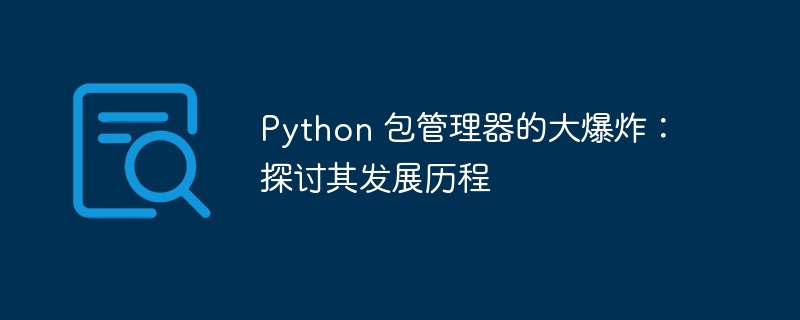

Early Years:
In the early stages of python, package management mainly relied on pip and setuptools. pip is a command line tool for installing and managing Python packages, while setuptools provides a framework for packaging and distributing Python project. While these tools provide basic package management capabilities, they have limitations, such as insufficient dependency management and lack of support for virtual environments.
The emergence of virtual environment:
As Python projects continue to grow in size and complexity, so does the need for virtual environments that isolate the dependencies of different projects. Virtualenv was the first widely adopted virtual environment tool for Python, allowing developers to install and manage specific versions of Python and software packages in an isolated environment.
The rise of package management systems:In order to solve the limitations of pip and setuptools, a more comprehensive package management system emerged. These systems provide enhanced support for dependency management, virtual environments, and other advanced features. Two of the most prominent systems are Conda and Anaconda. Conda provides fine-grained control over packages and environments, while Anaconda is a more comprehensive platform that includes a series of data science tools such as Conda and Jupyter Notebook.
Centralized package warehouse:In order to improve the efficiency of software package discovery and installation, the centralized package warehouse came into being. PyPI is the most famous package repository in Python, hosting a huge collection of Python packages
. PyPI allows users to search, browse, and install packages, and provides support for dependency management.Containerized package management:
With the development of container
technology, containerized package management has become a new trend in Python development.Docker Containers are a way to package an application and all of its dependencies into a single, portable unit. By using Docker containers, developers can ensure that their applications run consistently across different environments. Modern package management tools:
In recent years, a new generation of package management tools has emerged, aiming to improve ease of use and efficiency. These include pipenv, poetry, and hatch. These tools provide more intuitive and user-friendly interfaces to dependency management, virtual environments, and other advanced features.
Future Outlook:
The field of Python package management is still evolving, and new innovations may appear in the future. These innovations may include support for package signing, enhanced security
features, and further integration with other languages and platforms. As the Python community continues to grow, so will the need for efficient and reliable package management tools.The above is the detailed content of The explosion of Python package managers: exploring their evolution. For more information, please follow other related articles on the PHP Chinese website!




